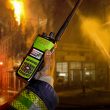House subcommittee asks pointed questions about D Block proposals (with related video)
Expressing concern about use of past federal investments of spectrum and money for public-safety communications, members of a key House subcommittee yesterday questioned whether proposals to reallocate the 700 MHz D Block and provide billions of dollars in federal funding would alleviate interoperability problems that exist today.
Multiple bills in the Senate and House call for the D Block — slated to be auctioned to commercial operators under current law — to be reallocated to public safety, which wants to build LTE networks on the D Block and its existing 700 MHz broadband spectrum to provide first responders with mobile access to myriad applications.
While all members of the House Communications and Technology subcommittee acknowledged the need for interoperable broadband networks, many raised doubts that reallocating the D Block to public safety would fix the problem.
"We have provided public safety with nearly 100 MHz of spectrum for their exclusive use," subcommittee Chairman Greg Walden (R-Ore.) said during yesterday hearing. "Given that fact, it's strange to me that the debate on public-safety communications has been so focused on the 700 MHz D Block."
Walden noted that public safety recently received 24 MHz of 700 MHz airwaves, which have been "woefully underutilized," as half the airwaves are being used to support narrowband LMR networks. Rep. Lee Terry (R-Neb.) echoed this sentiment while citing a report that indicates Congress has appropriated about $13 billion in funding for public safety during the past decade.
"We're being told that, to solve this problem, we need more money, more spectrum and new governance. Frankly, I don't know that any of those solve the problem," Terry said. "If you're not using the 24 MHz efficiently, why would we give you 10 more? It doesn't make sense to me. If $13 billion hasn't solved the problem, then what will?"
Rep. Joe Barton (R-Texas) agreed.
"It's a very vexing issue," Barton said. "We can say that, back in 2001, there was a legitimate excuse not to have an interoperable network. But 10 years later and … [after] $13 billion being spent at the federal level and the Digital Transition Act that freed up 24 MHz of spectrum for the public sector, I don't see that there's any excuse not to have an interoperable network. And I'm not sure it's a spectrum issue."
Panelist Jeff Johnson, representing the Public Safety Alliance, noted that the current spectrum allocation for public safety cited by lawmakers is somewhat misleading, because 50 of the 96 MHz for first responders is in the 4.9 GHz band, which lacks the propagation characteristics to be used for affordable wide-area broadband networks. Johnson also expressed support for public safety to have commercial partners in most networks and a governance model that would allow for local or regional operating control but ensure nationwide broadband interoperability.
Several subcommittee members asked whether the 12 MHz of 700 MHz spectrum currently allocated for public-safety narrowband use could be leveraged to support the broadband vision. However, multiple panelists noted that there is no broadband equivalent to mission-critical voice provided by LMR networks, so it is not an option today. When mission-critical voice over broadband is available, a transition plan to migrate those airwaves to broadband use should be explored, Johnson said.
Some members of the committee expressed support for Senate legislation introduced by Sen. Jay Rockefeller (D-W.Va.) that would reallocate the D Block to public safety and would authorize the FCC to conduct incentive auctions, the proceeds of which would be used to pay for the public-safety LTE networks being deployed.
"We have one chance to build this network, and we need to do it right," said Rep. Anna Eshoo (D-Calif.). "I don't want to have to revisit this."
Rep. Henry Waxman (D-Calif.) agreed, saying "we need to solve this problem." Waxman said he favors D Block reallocation and called on lawmakers to pass a law providing a first-responder broadband network before Sept. 11, the 10th anniversary of the infamous terrorist attacks on the U.S.
"We need to settle on a path forward and move quickly, and the only way that's going to happen is if we do it together on a bipartisan basis," Waxman said. "There's no reason why Congress cannot act before this somber anniversary."
But Terry said he does not believe the House should simply support the Senate bill.
"We've been pushed and continually asked why don't we just take up the Senate bill. I don't think the Senate bill really attacks … the problem," he said. "I'm not going to apologize. I will defend what this subcommittee is doing as being diligent, asking the tough questions and trying to find the right answers to solve this problem. That's what our job is."
















